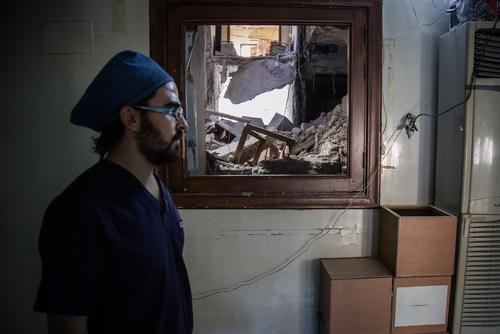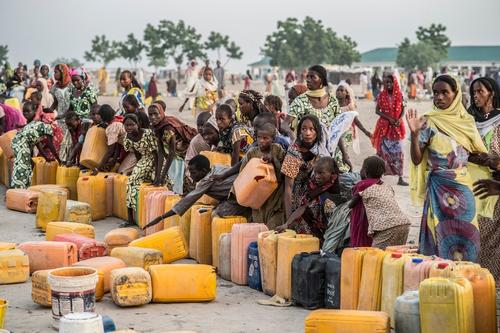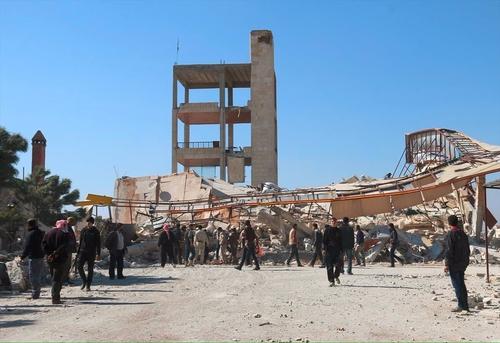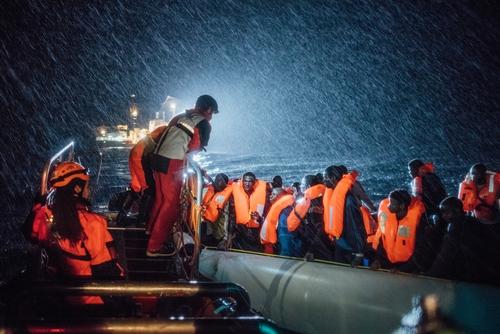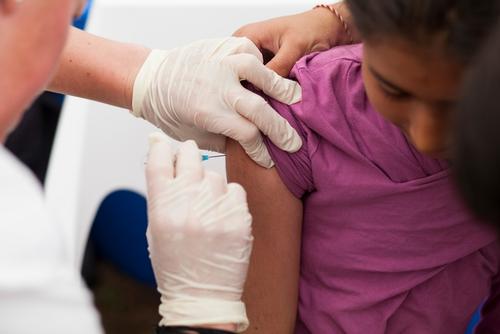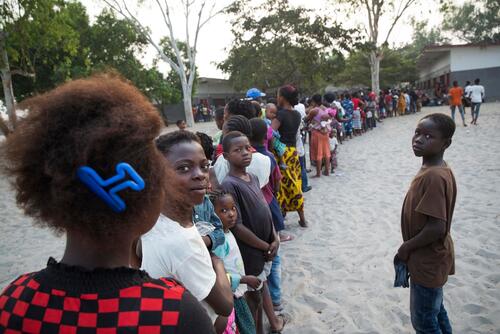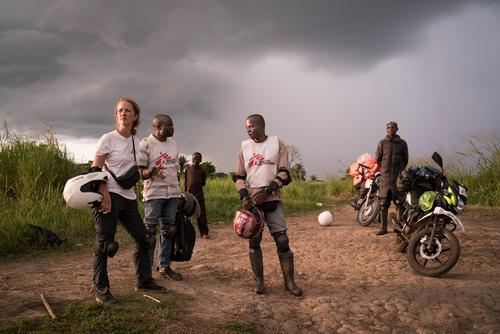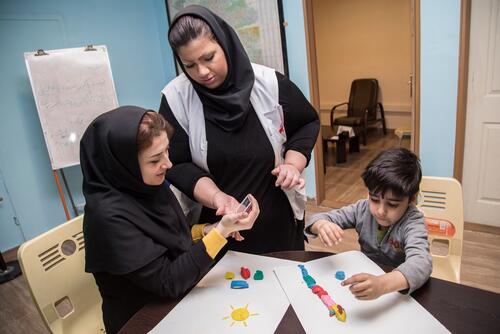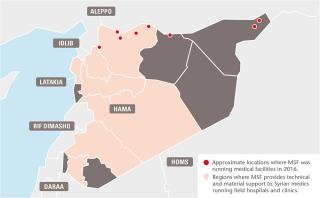
372,700
372,7
5,300
5,3
2,000
2,
Civilian areas have been routinely bombed and deprived of assistance. Access to food and healthcare remains extremely poor, especially in places under siege. Many hospitals are facing critical shortages of supplies and staff, as so many health workers have fled or been killed. Well over half of the Syrian population have been forced from their homes by the conflict. According to the UNHCR, the UN refugee agency, more than 4.8 million people have sought refuge abroad and another six million are internally displaced. Many remain trapped in areas that are under siege or stranded at the closed borders of neighbouring countries.
Medical facilities, staff and patients have been victims of indiscriminate and targeted attacks. In 2016, 32 medical facilities receiving support from MSF were bombed or shelled on 71 separate occasions. In one attack on 15 February, an MSF-supported hospital in Ma’arat Al Numan, Idlib governorate was hit by four missiles. Twenty-five people were killed and 11 were wounded, including hospital staff, patients, caretakers and visitors. On 27 April, at least 55 people, including patients and medical staff, were killed when airstrikes hit the MSF-supported Al Quds hospital and the surrounding neighbourhood in Aleppo city. According to the American University of Beirut Commission on Syria, 814 health workers have been killed since the war began.
MSF’s direct presence is significantly constrained in a country where it should be running some of its largest medical programmes. The Syrian government has not granted MSF authorisation to operate in the country, despite repeated requests, and insecurity has limited MSF’s ability to provide assistance in opposition-controlled areas. Following the Islamic State (IS) group’s abduction and release of MSF staff in 2014, and the impossibility of obtaining the necessary safety guarantees from its leadership, MSF withdrew from IS-controlled areas.
In 2016, MSF continued to operate directly in six medical facilities in regions controlled by other opposition forces across northern Syria and provide distance support to Syrian medical networks in areas where MSF cannot be directly present.
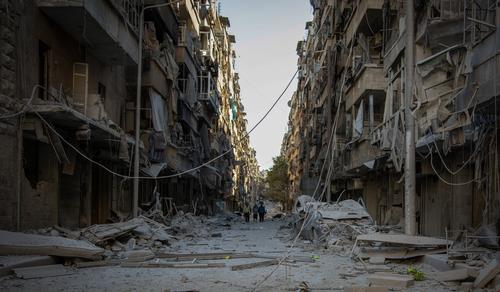
Aleppo governorate
Since 2014, MSF has been providing regular medical supplies to eight hospitals, six health centres and three first-aid points in eastern Aleppo city. However, following the consolidation of the siege by the government-led coalition in July 2016, these activities halted. Only one shipment of approximately 100 tonnes of medical supplies was delivered thereafter, when a temporary passage into eastern Aleppo was opened by opposition groups in August. Although no longer able to offer direct support, MSF kept in close contact with the doctors and nurses it had been working with in eastern Aleppo. They testified to the immense suffering of the people trapped in the city, where civilian areas, including hospitals, were routinely hit in targeted or indiscriminate bombings and shellings.
In December, the Syrian government took full control of Aleppo city and thousands of people from the eastern part were evacuated to rural areas of Idlib and Aleppo governorates. Since then, MSF has been running mobile clinics and distributing relief items in these areas, where it also organised a vaccination campaign.
In Azaz district, north of Aleppo, MSF runs the 34-bed Al Salamah hospital, offering a wide range of services including outpatient and inpatient consultations, emergency treatment, surgery and maternal care. Patients needing further treatment are referred to other facilities in the district or Turkey. In 2016, staff conducted 85,737 outpatient consultations, performed 1,598 surgical interventions and admitted 3,692 patients.
Renewed fighting in Azaz caused the displacement of more than 35,000 people: by April, more than 100,000 people were trapped between the frontline and the Turkish border. MSF delivered relief items and hygiene kits for 4,345 families (26,070 people) and tents for 1,330 families. A water and sanitation programme was also implemented in one of the informal settlements east of Azaz town.
In June, MSF supported vaccination activities in three districts of Aleppo governorate within the framework of an Expanded Programme on Immunisation (EPI), and conducted two measles vaccination campaigns.
In the Kobanê/Ain al-Arab area of northern Syria, MSF has worked alongside the local health administration since March 2015 to re-establish basic health facilities and vaccination services, provide outpatient healthcare and implement psychological support programmes. It currently supports nine primary health units, a maternity clinic and two hospitals. In 2016, five teams were deployed to 21 locations to conduct EPI vaccinations and screening for malnutrition. More than 101,680 outpatient consultations and 138 surgical interventions were carried out in MSF-supported facilities. In rural Jarablus, MSF partnered with the Turkish NGO AID to assist three primary health centres.
In the summer, shifting frontlines and a military offensive caused civilians to flee Manbij and settle near the Euphrates river. MSF scaled up its support to help meet the needs of the displaced and host communities. When people returned to their homes in August, they found that the city had been extensively planted with mines, booby traps and other explosive devices. Over the course of just four weeks, an MSF-supported hospital in Kobanê treated more than 190 people injured by explosive devices in Manbij.
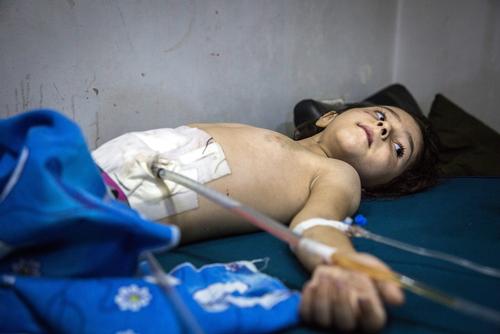
Idlib governorate
MSF continued to run a 20-bed burns hospital in Atmeh, providing patients with surgery, skin grafts, dressings and physiotherapy, as well as mental health support, emergency care and outpatient consultations. MSF also runs vaccinations, health education and disease surveillance activities in 180 camps and villages hosting approximately 165,000 internally displaced people around Atmeh, and ensures follow-up for patients requiring more specialised treatment in Turkey.
During 2016, the MSF team in Atmeh hospital carried out 2,883 emergency consultations, and performed 3,696 surgical interventions. Four hundred and thirty-nine patients were admitted to the inpatient wards and 398 were transferred to Turkey for further treatment. In the camps and villages, MSF staff administered more than 118,000 doses of vaccines to children under five.
In Qunaya, MSF scaled up its distance support to the regional referral hospital, comprehensively supporting all its services in terms of material and technical oversight. In 2016 the hospital provided 105,168 outpatient consultations and 12,011 cases were treated in the inpatient department. Teams also started supporting EPI activities in Qunaya and Darkoush hospitals, administering a total of 53,341 vaccines.
Hassakeh governorate
Since 2013, MSF teams have been offering primary health services, with a particular focus on maternal and child healthcare and chronic diseases, through three health centres, including a maternity clinic. These services are open to both internally displaced people and host communities, as well as to Iraqi refugees. This year, MSF teams provided 44,873 general consultations, 8,257 of which were for children under five. A total of 951 patients were treated for chronic diseases and 5,598 reproductive health consultations were provided. Staff also assisted an average of 170 births each month.
Distance support to medical facilities across Syria
Since 2011, MSF has been supporting a growing number of medical facilities in some of the areas worst affected by conflict where it has no direct access. This programme is mostly run from neighbouring countries and consists of donations of medicine, medical material and relief items; distance training for staff inside Syria; technical medical advice; and financial support to cover the facilities’ running costs. In besieged areas, the medics’ reliance on MSF’s underground support is all the more critical as medical essentials are often removed from the official aid convoys by the besieging forces.
In 2016, regular support was given to 80 medical structures across Syria, including in Aleppo, Dara’a, Hama, Homs, Idlib, Quneitra and rural Damascus governorates. These facilities conducted more than 2.2 million outpatient consultations, 770,000 emergency room consultations, 225,000 surgeries, and assisted over 29,000 births. Not all of these activities can be solely attributed to MSF programmes: while some facilities are exclusively supported by MSF, many benefit from additional sources of assistance. Ad hoc support, such as medical donations, was provided to an additional 80 medical facilities across the country.
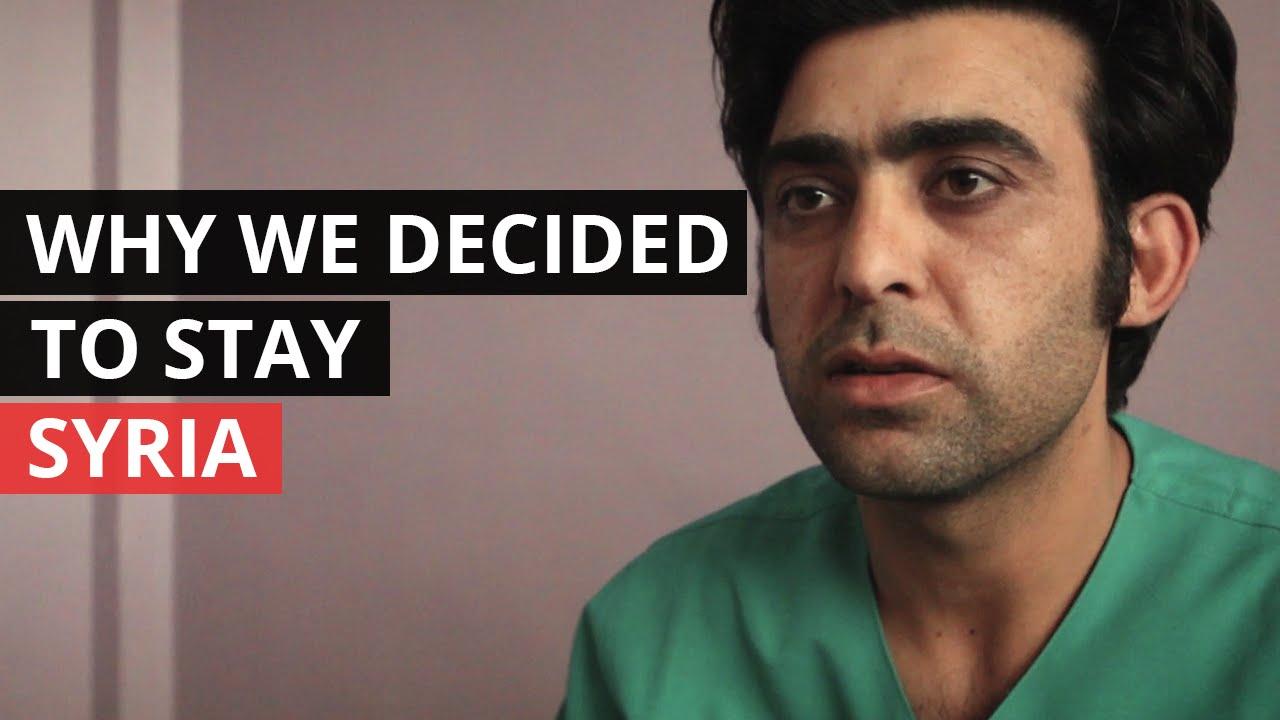
SYRIA | The hospital staff who refuse to leave
Staff story
MSF DOCTOR – Testimony of a medical practitioner who acts as a hospital director, human resource manager, surgeon and senior doctor in an MSF-supported hospital near Damascus.
“August was the worst we’ve seen [here] medically. Hundreds of injured are coming in. Sometimes we have to go two or three days without sleeping. This month is incomparable to before. It is the worst I’ve seen. We are trying our best. We are trying to save lives and that’s what is keeping us going. We cannot do anything about the siege, it is what it is, and we are just struggling to survive. Of course, I have to hang on to hope. There is always hope.
There is much fear and depression in our community. You see it everywhere. Whenever there is a shelling or the sound of a plane, everyone desperately rushes home or to a shelter. The sound of a plane in the sky is terrifying. It is hard to explain how the situation is on the ground. You have to see it with your own eyes to understand, and even then it is unbelievable. We have seen huge numbers of injured over the past month; in these circumstances anyone who isn’t injured or dead can count themselves lucky.
Medically, we’ve had to become used to the situation, so we do things like rationing of medicine. Rationing has become an important part of our work. We have no choice, so we try to make do with what we have. There are too many patients, too many stories. But one patient shows the madness of this crisis – a child – who I will never forget until I die: he had injuries all over his face, his arms, his legs, and yet he was laughing! Just laughing and laughing. Children usually are afraid of our injections and needles, but he was not. He just laughed, laughed at everything.”



